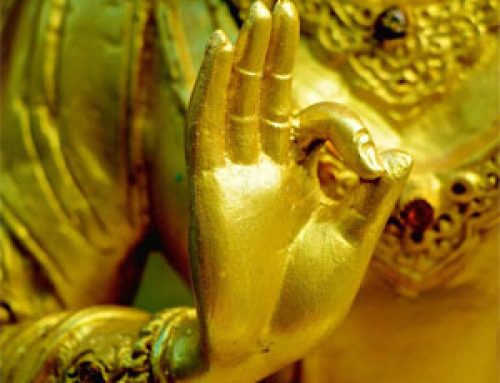A Do-It-Yourself Approach to Happiness
This is the eighth in a 9 part series on learning to practise Buddhism:
Part 1 | Part 2 | Part 3 | Part 4 | Part 5 | Part 6 | Part 7 | Part 8 | Part 9
Truthfulness
The seventh Perfection in Buddhist practice is truthfulness or sacca in Pali.
In Heart of a Buddha it is written:
The gift of Truth overcomes all gifts.
The joy of Truth overcomes all pleasures.
The taste of Truth overcomes all sweetness.
The loss of desire overcomes all sorrows. 1
When we examine the subject of truth as a Buddhist we will see that it is at the core of everything we call Buddhism and particularly the life and teachings of the founder of our religion, the Buddha.
What did the Prince renounce the world and leave his royal lifestyle to search for? What did the Bodhisattva find out sitting under the Bodhi tree on the night of his enlightenment? What did he teach to his disciples for the following years of his life which was his gift to the world? What is our motive for practicing Buddhism 2500 years later?
Therefore we need to approach truth and truthfulness with care and understanding in order to penetrate into the real meaning of the Buddha’s teaching. We have to set ourselves up through our Buddhist practice to know the way things really are directly for ourselves.
Many people have in the past sought the truth. It is what they have sought the truth about, and how they have gone about finding it that has determined the knowledge or learning they gained from their quest. Buddha sought the truth about why sentient beings suffer and whether there is there a way to escape or avoid the sufferings that are experienced in life.
In Buddhism we divide knowledge into two categories. The first we call worldly knowledge (lokiya in Pali) which is knowledge about worldly matters such as the learning we do at school or the learning done in science and business – all the knowledge to do with worldly events and activities. The second category we call supra-mundane wisdom (lokuttara in Pali) which is knowledge about the Path leading to liberation including the Four Noble Truths, the Enlightenment Factors, the Ten Perfections and the unconditioned mind, nibanna or nirvana in Sanskrit.
In Buddhism we value both types of knowledge and learning as both are needed for the basis of being able to live skillfully in the world, and to use our precious opportunity of human rebirth to abandon the causes of our sufferings. So how do we set ourselves up to know the truth about things, or in other words, how do we create the right causes and mental conditions where we see things clearly as they really are automatically as a result?
Practicing truthfulness in our thoughts, words and deeds clearly leads us to the right outcomes. Keeping the precept of refraining from lying is fundamental to learning and developing good understanding.
The act of lying is an act of distorting the truth or distorting the reality in a way which suits the person lying. The act of distorting the truth creates kamma for the person lying so that in the future they will find it more difficult to receive the truth in their own minds.
Either people lie to them, or they get poor information about things they wish to know, or if they are told the correct information they will tend to not believe it, discount it or mistake what they heard. Even in a worldly sense it is important to find out the truth about things.
It is a common occurrence to find that a person has believed you said something; but it wasn’t what you actually said. Quite frequently we find out we have acted on some incorrect information about something and so we have wasted a lot of time, or bought something we didn’t need, or went somewhere to meet someone and got the time or place wrong. And so on. It happens to us regularly.
These examples of miss-information we get in our minds are caused by giving out miss-information or lying to others in the past.
The Chu Fa Chi Yao Sutra says that:
“Lying obscures the truth and carries us farther and farther away from it. Lying creates innumerable obstacles to finding the way to liberation.”
– Being Good (Hsing Yun 1998) 2
Why does one lie?
There are many reasons why we may have this tendency towards unskillful speech. It could be just lack of attentiveness and lack of intention to keep the precept to refrain from lying. We have kammic causes from our past of not practicing to refrain from lying, so there is a latent tendency to do it. We may have the habit from our childhood so again we have a disposition to continue the habit. We can over ride this kamma by applying mindfulness of our present action and speech to refrain from that kamma and not lie.
Lying is often done in an attempt to try get around the eight worldly conditions. That is lying to avoid being blamed for something, or to court praise. Lying done for some apparent gain and then lies to ward off some perceived loss. The same for the pairs of honour and dishonor, and happiness and unhappiness.
If we lie seeking some worldly benefit, unknown to the mind that lies, we are moving further and further away from many things which we really need for our wellbeing and happiness, such as being able to understanding things clearly and not being confused, getting accurate information, finding out important information in a timely manner, and ease of learning on the Buddha Dhamma Path.
In the Upasakashila Sutra it says that
“lying leads to poor speaking abilities”.
Lying leads to not being believed or trusted, not only because people found out a person lied in the past, but because of the working of kamma from earlier times. Some peoples words are listened to attentively with respect, others are not.
In Venerable Narada Thera’s ‘The Buddha and His Teachings’ it is written:
{A Bodhisattva}…does not use flattery to win the hearts of others, does not exalt himself to win their admiration, does not hide his defects or vainly exhibit his virtues. The praiseworthy he praises without malice, the blameworthy he blames judiciously, not with contempt but out of compassion. Even the truth he does not always utter. Should such utterance not be conducive to the good and happiness of others, then he remains silent. If any truth seems beneficial to others, he utters it, however detrimental to himself it may be. And he honours the word of others as he honours his own. (Narada 1988)3
In Heart of a Buddha it is written:
If you know anything that is hurtful and untrue, do not say it.
If you know anything that is helpful but untrue, do not say it.
If you know anything that is hurtful but true, do not say it.
If you know anything that is helpful and true, find the right time.4
So let us consider some of the more subtle ways we may be lying to ourselves and others without realizing it.
Globalizing
Examples of this often involve words like “always” and “everything”. You can hear them in statements like: “She always criticizes me” or “They always stuff things up”.
Angry minds tend to use statements like this rather than truthful statements because the logic system of anger is often based on over reaction to events and subsequently blowing things way out of proportion.
It may seem more justified to be angry with someone who is “always criticizing me” but no one criticizes another person 24 hours a day.
There are many statements we use like this every day in common parlance which, when considered, turn out to be untrue.
Even when statements are not exaggerations but just a conviction a person is holding still we need to be careful. There is a big difference between saying, for example, “Ford cars are better than Holden cars” rather than saying “I believe Ford cars are better than Holden cars”. The difference is in the second case the words used are safeguarding the truth.
The first statement could be wrong, depending on what criteria are used to judge what makes a car better. It may seem inconsequential however attention to truthfulness builds the right kamma and conditions to understand the truth about things.
Awfulizing
Examples of this are when we use emotive words such as awful, terrible, horrible and shocking to express how we feel about minor things which have happened. “You should have seen the awful mess she left in the kitchen for me to clean up”. “He’s got this shocking habit of leaving wet towels on the bathroom floor”.
Often this type of statement is said by a person is trying to make a case for themselves or a case against another person and such emotive words are used to boost the grounds for complaint against the other person.
Words have a clearly defined meaning which can be used as an accurate representation of what has happened, or what you wish to communicate. As we move further and further away from the real dictionary meaning of words in our daily usage of them we are creating the kamma of distorting what really happened by our unskillful use and choice of inappropriate words.
Words are building blocks of our communication and understanding so it is better to have a big vocabulary and respect for the actual meaning of words to be able to describe and explain things clearly and truthfully.
Generalizing
“The bosses only look out for themselves”
“The banks are ripping everyone off”.
These statements are 100% all or nothing comments about something, and they are common enough, but they are seldom accurate or truthful.
Slandering and “Playing Blemish”
Slandering others comes from the root of hate or greed. Slandering another person often comes from the motive of making ourselves look good, or to produce some gain for ourselves at the slandered person’s expense. Its objective is to denigrate another person, put them down and by comparison, because we have identified their fault, we must be superior to them.
Slandering is also used by persons to attack things they don’t like personally, without accounting for whether there is any truth in the statements being made. For example people regularly slander politicians as a group regardless of the tireless work they perform in governing the country and regardless that some politicians are intelligent, sincere and genuine persons.
The slander concentrates on a few aspects of behaviour which we may find disagreeable and ignores all other activities and benefits which may be associated with the object of the slander. Sure, there are things which we can point to regarding the faults of others, but slander is not a balanced view. It is lopsided and selfishly motivated.
Playing “blemish” is the idle behaviour of finding fault with things or persons and using that as the basis of conversations with others. Look carefully at your conversations to see how frequently the wish to make conversation results in finding common ground with the other person in a “game” of blemish.
Hype
This is where a person is acting with excessive buzz or noise on their minds. These type of minds tend to sensationalize things or hype them up and that is where truth gets abandoned in favour of more buzz.
Fantasizing
Fantasizing happens when our minds lose contact with the present moment. Instead of being mindful of what is happening moment by moment, our minds play with thoughts of the past or future.
If we examine our fantasizing often the ego is at play in a scenario where it’s wishes come true. It wins every argument it has, it proves itself to be right over and over again, it can get anything it wants. The other persons in the fantasy are just objects for the ego to fulfill it’s one-sided self cherishing.
It is only through practicing mindfulness of the present that we will be able to develop minds which can wake us up from our dreams.
Flattery
Master Hsing Yun writes:
“A common form of duplicity is flattery. Flattery is always engaged in for ulterior reasons. Flattery is a form of trickery used to get something to do something or give something they would not otherwise do or give. Whenever we smile falsely or use words to create false feelings among people, we are guilty of an offense against truth. Actions like these damage the natural trust that should prevail among groups of people.” (Hsing Yun 1998) 5
Summary
Again from Master Hsing Yun
The importance of speech cannot be overemphasized. People create most of their bad karma through speech.
Speech is the single most powerful means by which we interact with other people. Our choice of words, our tone of voice, even our selection of subject matter can have the profoundest influence on other people. Intemperate or ill-considered speech often leads to misunderstanding, suspicion, and anger. (Hsing Yun 1998) 6
From Venerable Narada Thera we read:
Truthfulness or Sacca is the seventh Perfection. By Sacca is here meant the fulfillment of one’s promise. This is one of the salient characteristics of a Bodhisatta, for he is no breaker of his word. He acts as he speaks, he speaks as he acts. (yathāvādītath akārīyathākāri tathāvādi).
He makes truth his guide, and holds it his bounden duty to keep his word. He ponders well before he makes his promise, but once made the promise is fulfilled at any cost, even that of his life. (Narada 1988) 7
From Acariya Dhammapala’s Commentary to the Cariyapitaka:
One devoted to truth secures the foundation of all noble qualities. With truthfulness as the foundation, he is capable of purifying and fulfilling all the requisites of enlightenment. Not deceived about the true nature of phenomena, he performs the functions of all the requisites of enlightenment and completes the practice of the Bodhisattva path. (Dhammapala 6th cent.) 8
References
- Amitabha Publications. 2005. Heart of a Buddha. Published by Amitabha Publications, Taiwan. Published online at http://www.namoamitabha.net/en/publication/heart_of_buddha/heart_of_buddha.htm
- Master Hsing Yun. 1998. Being Good, Buddhist Ethics for Everyday Life with permission by Buddha’s Light Publications, USA. Published September 2009, Translated by Tom Graham
- Ven. Narada Thera. 1988. The Buddha and His Teachings. Published by the Buddhist Missionary Society, 123, Jalan Berhala, 50470, Kuala Lumpur, Malaysia.
- Amitabha Publications. 2005. Heart of a Buddha. Published by Amitabha Publications, Taiwan. Published online at http://www.namoamitabha.net/en/publication/heart_of_buddha/heart_of_buddha.htm
- Master Hsing Yun. 1998. Being Good, Buddhist Ethics for Everyday Life with permission by Buddha’s Light Publications, USA. Published September 2009, Translated by Tom Graham
- Master Hsing Yun. 1998. Being Good, Buddhist Ethics for Everyday Life with permission by Buddha’s Light Publications, USA. Published September 2009, Translated by Tom Graham
- Ven. Narada Thera. 1988. The Buddha and His Teachings. Published by the Buddhist Missionary Society, 123, Jalan Berhala, 50470, Kuala Lumpur, Malaysia.
- Achariya Dhammapala. 6th cent. A Treatise on the Paramis. Translated by Bhikkhu Bodhi. Published online at www.accesstoinsight.org. Originally published in The Wheel Publication No. 409/411 (Kandy: Buddhist Publication Society, 1978). Transcribed from a file provided by the BPS, with minor revisions in accordance with the ATI style sheet.



